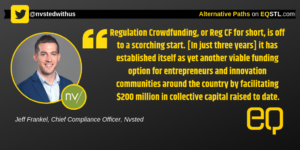
An Introduction to Regulation Crowdfunding
On April 15th, Ched Wagner, Manager of Nvsted, is hosting a panel discussion at EQ Leadership Labs on Crowdfunding Your Business.
Writing by Ched Wagner. Ched Wagner is the Manager of Nvsted, overseeing the daily operations of the funding platform, including origination, company onboarding, cash flow management, compliance monitoring, and marketing. Prior to Nvsted, Ched was a personal banker for Wells Fargo in Southern California where he specialized as a Business Advocate, helping small businesses manage their finances. Ched also was previously a finance technician for the United States Air Force, and an intern for Advantage Capital Partners’ Investment Team in St. Louis.
Until recently, 90 percent of Americans were banned from making private investments in startup companies. That’s because prior to legislation approved in May 2016, private investments in startup companies were only available for accredited investors, which for an individual is defined as having an annual income exceeding $200,000 or a net worth exceeding $1 million.
Yet, individuals meeting such lofty requirements account for only 10% of the population of the United States.
On April 5th, 2012, President Barack Obama signed the Jumpstart Our Business Startups (JOBS) Act, a revolutionary piece of legislation that was designed to change the way small businesses can raise capital. There are many parts of the JOBS Act, but one section in particular, Title III, has gained the most attention because it specifically allows for companies to use crowdfunding to solicit investments from more people around the United States.
Title III of the JOBS Act, more affectionately known as Regulation Crowdfunding (Reg CF), is ground-breaking because it allows everyday investors to participate in the startup’s capital raise efforts. Thanks to the rule change, companies may now raise money by offering securities (equity or debt) to everyday investors.
Since Reg CF was brought into effect, the industry has grown rapidly, seeing nearly $200 million in investment commitments in the 2.5-year span.
In 2018 alone, 680 companies raised $109 million from 148k investors. Companies offering securities under Regulation Crowdfunding are able to raise up to $1.07 million in a 12-month period, and 19 companies were able to raise that maximum amount in 2018.
Reg CF is not only becoming an effective way for startups to raise capital, it is also starting to show substantial progress in its goal of supporting the United States economy. Sherwood Neiss, one of the earliest proponents of securities crowdfunding in the U.S., is quoted in a recent article by Crowdfund Insider as saying, “Back in 2012, the promise of Regulation Crowdfunding was jobs, a local economic generator, and an industry revitalizer.
With the close of the third calendar year of Reg CF we can see that those promises are holding true. Reg CF is proving to be a jobs engine (creating on average 2.9 jobs per issuer), economic generator (pumping over $289 million of revenues into local economies) and industry supporter (enabling 82 unique industries in regions across the USA).”
Although Reg CF has generated only modest investment numbers so far, there is optimism that the current growth of the industry is just the beginning of a larger change. There has already been substantial discussion and legislative acts aimed at making the industry more appealing by increasing the maximum raise amount from $1.07 million up to $5 million, allowing for Special Purpose Vehicles (SPVs) to be used, and permitting companies to “test the waters” prior to starting a crowdfunding raise.
Even without these improvements yet being implemented, the 2018 State of Regulation Crowdfunding report states that, “The rapid increase in the number of offerings and investors proves that there continues to be an appetite for Regulation Crowdfunding from both issuers seeking capital as well as investors looking to diversify.”
The report goes on to say that, “Comparing the average days to close (113) in 2018 and average raise ($250,635) of a successful Regulation Crowdfunding campaign… Regulation Crowdfunding most likely represents the most efficient, cost-effective way to raise capital for startups and SMEs.”
If you are a startup founder and are looking for ways to raise your next round of capital, Regulation Crowdfunding may well be your answer.
Companies local to St. Louis, MO, can utilize the regionally-based Nvsted funding platform, which was created with a hyperlocal focus specifically for St. Louis startups.







